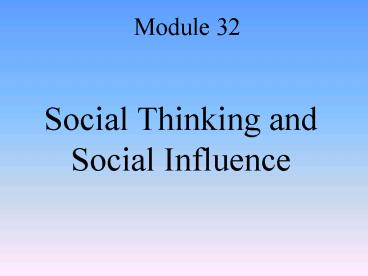Social Thinking and Social Influence - PowerPoint PPT Presentation
1 / 33
Title:
Social Thinking and Social Influence
Description:
The scientific study of how people think about, influence, and relate to one another ... People tend to give a causal explanation ... Self-Fulfilling Prophecies ... – PowerPoint PPT presentation
Number of Views:1060
Avg rating:3.0/5.0
Title: Social Thinking and Social Influence
1
Social Thinking and Social Influence
- Module 32
2
Social Psychology
- The scientific study of how people think about,
influence, and relate to one another
3
Attribution Theory
- People tend to give a causal explanation for
someones behavior, often by crediting either the
situation or the persons disposition
4
Situational Disposition
- Attributing someones actions to the various
factors in the situation
5
Dispositional Attribution
- Attributing someones actions to the persons
disposition, i.e. their thoughts, feelings,
personality characteristics, etc.
6
Fundamental Attribution Error
- The tendency for observers, when analyzing
anothers behavior, to underestimate the impact
of the situation and overestimate the impact of
personal disposition - People tend to blame or credit the person more
than the situation
7
Video
- Women in the KKK
8
Attitude
- A belief and feeling that predisposes a person to
respond in a particular way to objects, people,
and events
9
Attitudes Affecting Actions
- Many studies suggest a persons attitudes do not
match their actions - Attitudes can predict behavior if
- Outside influences are minimal
- People are aware of their attitudes
- Attitude is relevant to behavior
10
Actions Affecting Attitudes
- Under some circumstances ones actions can
influence attitudes. They include - Foot-in-the-door phenomenon
- Role playing
- Cognitive dissonance
11
Foot-in-the-Door Phenomenon
- The tendency for people who have first agreed to
a small request to comply later with a larger
request
12
Role Playing
- Playing a role can influence or change ones
attitude - Zimbardos Prison Study
- College students played the role of guard or
prisoner in a simulated prison. - The study was ended when the guards became too
aggressive and cruel.
13
Video
- Zimbardos Prison Study
14
Cognitive Dissonance
- The theory that people act to reduce the
discomfort (dissonance) they feel when their
thoughts are inconsistent with their actions - When our attitudes are inconsistent with our
actions, we change our attitudes to reduce the
dissonance.
15
Conformity
- Adjusting ones behavior or thinking to coincide
with a group standard
16
Solomon Asch (1907-1996)
- Social psychologist who researched the
circumstances under which people conform
17
Aschs Conformity Study
18
Aschs Conformity Study
19
Factors Increasing Conformity
- The person feels incompetent or insecure.
- The group has three or more people.
- The rest of the group is unanimous.
- The person is impressed by the status of the
group. - No prior commitments were made.
- The group is observing the person respond.
- Ones culture encourages conformity.
20
Stanley Milgram (1933-1984)
- Social psychologist who researched obedience to
authority
21
Obedience
- The tendency to comply with orders, implied or
real, from someone perceived as an authority
22
Milgrams Obedience to Authority
23
Milgrams Obedience to Authority
24
Milgrams Obedience to Authority(Data from
Milgram, 1974)
25
Milgrams Obedience to Authority
26
Video
Obedience to Authority
27
Social Facilitation
- Improved performance of tasks in the presence of
others - Occurs with simple or well learned tasks but not
with tasks that are difficult or not yet learned
28
Social Loafing
- The tendency for people in a group to exert less
effort when pooling their efforts toward
attaining a common goal than when individually
accountable - People may be less accountable in a group, or
they may think their efforts arent needed.
29
Deindividuation
- The loss of self-awareness and self-restraint
occurring in group situations that foster arousal
and anonymity - People lose their sense of responsibility when in
a group.
30
Group Polarization
- The enhancement of a groups prevailing attitudes
through discussion within the group
31
Groupthink
- The mode of thinking that occurs when the desire
for harmony in a decision- making group overrides
a realistic appraisal of the alternatives
32
Self-Fulfilling Prophecies
- Occurs when belief about others leads one to act
in ways that induce the others to appear to
confirm the belief
33
The End































